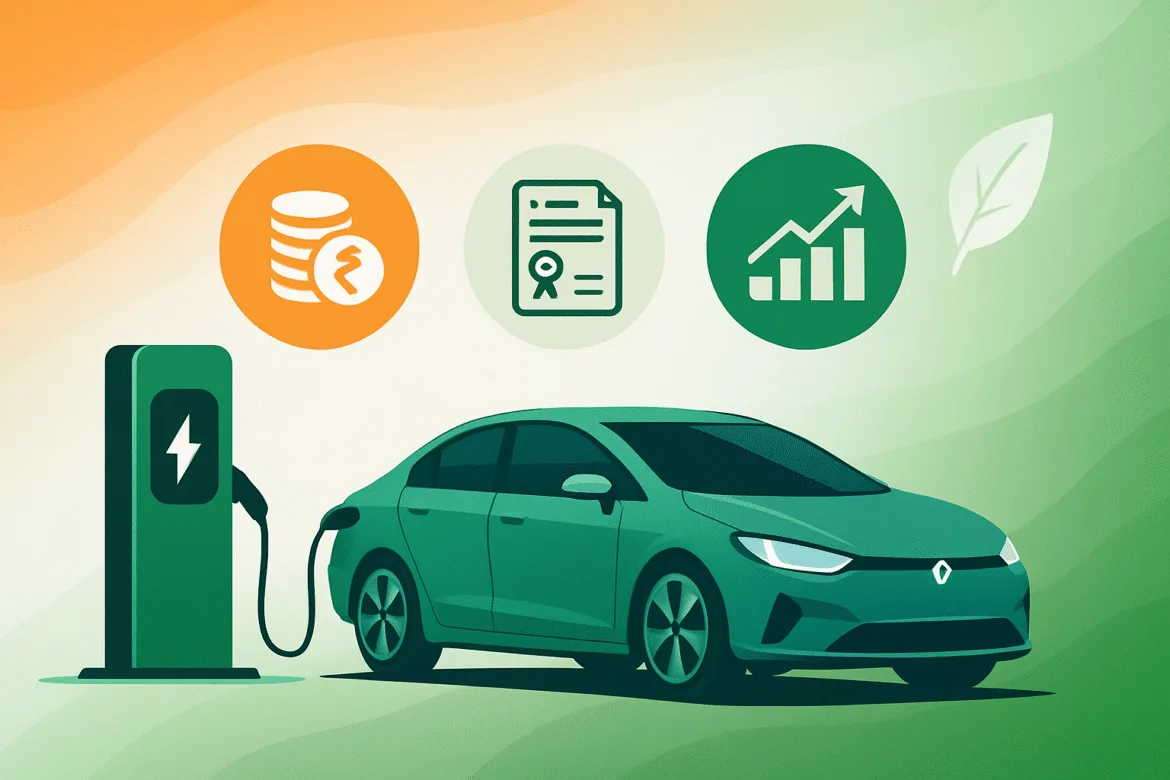India’s electric vehicle (EV) sector is undergoing rapid expansion fueled by government incentives, rising eco-consciousness, and technological advancements.
The Indian government aims for ambitious targets by 2030, including 30% EV sales in private cars and up to 80% in two- and three-wheelers, totalling an anticipated 80 million EVs on roads. The sector’s growth is reflected in recent data showing a surge in sales, investments, production, and infrastructure development.
Key Market Growth and Sales Data
India’s EV market size surged to approximately USD 18.79 billion in 2025, expected to reach over USD 1 trillion by 2034, growing at a compound annual growth rate (CAGR) of 57.3% from 2025 to 2034. Recent sales figures illustrate robust momentum: electric vehicle sales in India hit nearly 2 million units in fiscal year 2025, marking a 20% year-on-year increase. Electric two-wheelers constitute the largest segment, representing 59% of EV sales, followed by three-wheelers at 36%, and four-wheelers at 5%. Electric passenger vehicle sales crossed 100,000 units in FY25 with 18.2% growth, while electric two-wheelers and three-
wheelers grew 21.2% and 10.5%, respectively.
In monthly data, January 2025 saw a 19.4% month-on-month and 17.1% year-on-year increase, reaching 169,931 units sold. By August 2025, electric car sales rose sharply by 155% year-on-year, with Tata Motors and Mahindra & Mahindra among key contributors.
Production and Manufacturing Investments
Battery electric vehicle production is slated to nearly triple in 2025 compared to the previous year, reaching approximately 377,000 units for light vehicles, driven by major domestic and international automakers such as Maruti Suzuki, Hyundai, Tata Motors, Mahindra & Mahindra, and JSW MG Motor. These manufacturers are also planning the launch of nearly two dozen new EV models in 2025, indicating growing confidence and market reach.
Significant investments have been announced to expand India’s domestic EV production and supply chain capabilities. Tata Motors is investing over USD 2 billion to build a lithium-ion cell manufacturing plant and plans to derive 30-40% of its sales from EVs by FY30. Mahindra & Mahindra pledged approximately USD 1.44 billion over three years to boost its electric vehicle arm. Indian conglomerate JSW Group is venturing into electric vehicles with USD 1.5 billion JV with China’s SAIC Motor and aiming to establish local EV brand manufacturing in Maharashtra.
EV Charging Infrastructure
As of early 2025, India operates over 26,000 public EV charging stations with Maharashtra, Delhi, and Karnataka leading in deployment. The government has earmarked large budgets, including Rs. 2,000 crore (approx. USD 234 million) under the PM E-DRIVE Scheme, to expand charging infrastructure nationwide, aiming for over 1.3 million charging stations by 2030. Industry and automaker initiatives are contributing actively to this effort; for instance, Hyundai Motor India is expanding ultra-fast EV charging stations across key cities and highways.
Government Support
Government schemes remain fundamental to the sector’s growth. The Faster Adoption and Manufacturing of (Hybrid &) Electric Vehicles (FAME) scheme Phase II, operational since 2019, involves a budget of approximately USD 1.43 billion encouraging electrification of public and shared transport. By the end of 2023, significant subsidies had been allocated for over 1.3 million EV units. The government’s Production Linked Incentive (PLI) scheme for automobiles and components saw a sharp increase in funding to support manufacturing, while the PM E-DRIVE Scheme was introduced with a budget of Rs. 10,900 crore (USD 1.28 billion) to further promote electric mobility and reduce fossil fuel usage.
State policies also play a crucial role, with Uttar Pradesh focusing on e-rickshaw adoption, Maharashtra targeting a 10% EV share in new vehicle registrations by the end of 2025, and Karnataka planning the electrification of all three- and four-wheeler cargo vehicles by 2030.
Backgrounder: Industry Landscape and Trends
The Indian EV market is positioning itself amid global trends of electrification, sustainability commitments, and rapid technological innovation. The sector benefits from government climate targets, including India’s pledge to net-zero emissions by 2070, which spurs demand for cleaner transportation. The automotive industry is undergoing strategic realignment with higher allocations for EV manufacturing incentives and incentives for domestic battery production, key to reducing dependence on imports.
Consumer readiness is high, with surveys indicating over 80% willingness to adopt new energy vehicles by the decade’s end. Consumer adoption is also facilitated by expanding infrastructure and rising local manufacturing capabilities. Additionally, investment flows into battery production and EV finance sectors are accelerating, with anticipated surge in financing to USD 50 billion by 2030. Challenges remain including the need for a robust national charging network and technological advancements to reduce EV costs further.
For more industry insights, visit www.batterynews.in for related articles on EV battery investments and charging infrastructure development.


Leave a Reply